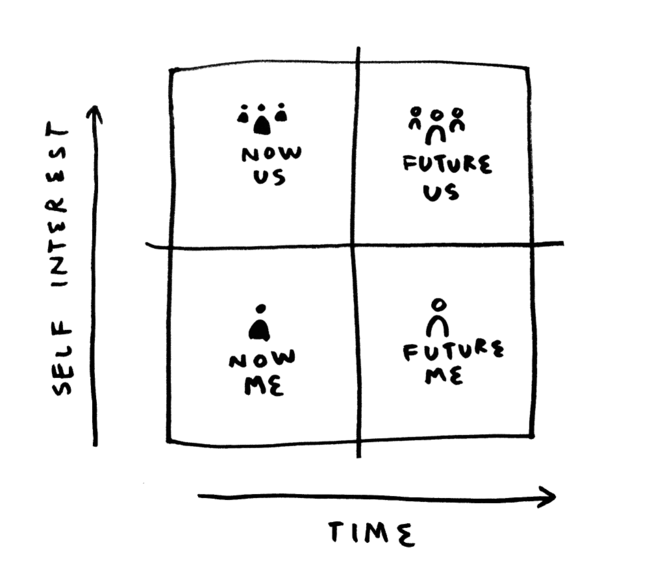Bentoism
A map to liberate ourselves from the “Now Me.”
A map to liberate ourselves from the “Now Me.”
At IFTF’s 2020 Ten-Year Forecast Summit we were joined by Yancey Strickler, Co-Founder of Kickstarter and author of This Could be Our Future: A Manifesto for a More Generous World. Strickler shared his personal method for making decisions, which is based on seeing the full spectrum of our self-interests (our values, needs, and goals) and thinking beyond the present moment. It’s a method he calls Bentoism, and he’s used it for the past 3-4 years to guide his life choices. Read on to find out what Bentoism is, and what our future could look like if more individuals and organizations used it to exit the unhealthy cycle of short-termism.
Bentoism comes from the word Bento, which is Strickler’s acronym for “BEyond Near Term Orientation.” The Bento is a two-by-two matrix with an x-axis of time and a y-axis of self-interest, and the four dimensions constructed are “Now Me”, “Now Us”, “Future Me”, and “Future Us.”

The term Bentoism also comes from the Japanese bento box, a beautifully designed meal box with separate spaces for small morsels of food. The philosophy behind the bento box, “hara hachi bu,” is that you should consume a balanced variety and still remain about 20% hungry for tomorrow. Many attribute the health and longevity of the Japanese people to this life philosophy. “Hara hachi bu” is essentially a foresight practice that advocates planning for the future.

Strickler argues that most of us are locked in a “Now Me” dimension, living life with a “passive awareness” where we only act based on our short-term incentives and self-interest. He believes we’re in a collective state of sustained decline because so many of us are trapped in this box of short-termism. By only thinking of the “now” and having a narrow view of the self, we’re ruining our chances of having a secure future. Examples of this in American society abound, from prioritizing profits from fossil fuels over securing clean, healthy water and air for ourselves and our kids in the future, to having low corporate taxes and high executive salaries instead of more equitable worker wages and state funds to support those in need.
As individuals, we usually make decisions for action based on our self-interest, which is defined by what we believe aligns with our values, needs, and goals. In Strickler’s view, the Bento provides a framework to expand how we think of our self-interest so that we can shift our decision-making process. Rather than seeing our self-interest as something existing primarily in the present and only involving our singular selves, the Bento matrix demonstrates that our self-interest also includes the present state of our community—those closest to us on whom we rely and who rely on us—as well as our future or older selves, and the future or older selves of those in our community.
You can put the method of Bentoism to use for decision-making as an individual or as an organization. First, grab some paper to draw your own 2x2 Bento Box tailored to you or your group, where you identify your values, needs, and goals for each of the four dimensions. (You can find step-by-step instructions on building your own Bento here.) What are the wants and needs of your Now Me? Perhaps it’s autonomy and pleasure. What are they for the wiser version of yourself, your Future Me? Perhaps it’s having integrity, staying true to your morals, and being in good health. For your Now Us? Maybe you need support and want to feel connected. What about the wants and needs for your children and children’s children, your Future Us? You may want them to be happy and safe, and live in a better society with better opportunities.
Once you’ve filled out your values, needs, and goals for your entire Box, present it with a decision (“Should I…?” prompts are the best). Move through the four spaces to see how the question would be answered in each one. For example, should I stay home for the holidays? Your Now Me might say “no” because you want to have fun and enjoy your time off traveling. How would your Future Me respond? It’ll probably say “yes” because it doesn’t want to get sick and possibly die from COVID-19. What would your Now Us say? It might say “no” because your loved ones want to spend time with you, or “yes” since there are plenty of ways to stay connected virtually. And what about your Future Us? It might say “yes” to staying at home because it also wants you and your community to stay healthy and alive. While it won’t give you a clear-cut answer to your question every time, the matrix provides a more nuanced picture and better reflects the complexities of your life. With practice it will hopefully liberate you from the simple Now Me short-termism, and you’ll make decisions that listen to the full spectrum of your values, needs, and goals.
Imagine the larger implications if more of us used the Bento to think big picture. Many of us take two things for granted: (1) As time moves forward, things can only improve, so our lives can only get better (a progressive notion of time); and (2) Our ability to achieve goals is determined by ourselves and not anyone else (rugged individualism). But the pandemic has demonstrated that societal progression is not inevitable and that our health, well-being, and security is connected to the health, well-being, and security of others. If more people actively saw and thought about the multiple dimensions of their self-interest, making space for their community and for the future, we could build a world that takes action with future generations in mind.
If you’d like to learn more about Bentoism, check out Yancey Strickler’s site bentoism.org and sign up to attend a weekly virtual meeting of the Bento Society.